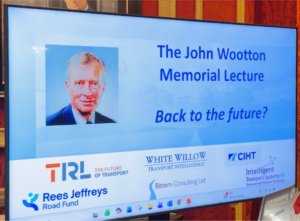The winners of the first stage of the £150,000 2021 Rees Jeffreys Road Fund Competition have been revealed.
Seven organisations were awarded £5,000 development grants, and will now have three months to develop their ideas in competition for the final grant of up to £150,000.
The competition is being run by the The Trustees in order to celebrate 150 years since the birth of the charity’s benefactor, William Rees Jeffreys.
In each of the two schools categories – primary and secondary – one winner was awarded £5,000, and two runners-up each received £2,000. The judges also awarded a special £2,000 discretionary prize.
The seven £5,000 shortlisted winners are:
Royal Society for the Prevention of Accidents (RoSPA)
Cycle Smart: a vision for safer and better cycling
This project uses technology from cyclists’ bike lights, which also act as bicycle sensors, to predict where collisions involving cyclists are likely to occur, and then puts in place measures to prevent them.
Gemma Bridge
Augmented reality and its potential to enhance collaboration in the planning process
The development of an augmented reality app would increase engagement, reducing time-consuming consultation periods, therefore giving more people the opportunity to speak out and share their views on plans.
Reed Mobility
Developing ethical goal functions for road use
CAV behaviour should be directed using ‘ethical goal functions’ (EGFs). This concept embeds the ethical interests of society into functions against which CAV developers can optimise the performance of their systems; developing and assessing these behaviours in simulation before deploying vehicles on real roads.
Eloy
Eloy Connected Vehicle Platform
Connected vehicle services are vital for road innovation and should be incorporated into SATNAV systems and existing in-vehicle experiences. This project would build a connected vehicle partner platform, enabling partners to use Eloy’s technology to create their own new services and so reduce R&D cost, complexity and the need for testing.
Phil Carey Consulting
Wistle: working to improve the single-track lane experience
A proposal for a new management regime for the many UK minor roads not wide enough for two vehicles to easily pass each other. Wistle uses the functionality of basic vehicle-to-vehicle communication, combined with data and detailed mapping, to alert vehicles to safe passing options.
Jenny Clark
Rainbow Routes to School
Children’s journeys to school should be enjoyable, safe and healthy. This project builds on existing air-quality monitoring in local schools and embeds ‘rainbow routes’ within a new research project collecting smartphone app-based data on active travel. The aim is to close data gaps and speed up interventions that favour safe, active and independent travel for children.
Loughborough University
NEW SURFACES (Novel Engineering Ways to Soften Urban Roads, Footways And Cars to Enhance Safety)
This concept aims to identify priority accident spots and replace current hard surfaces (steel, concrete and asphalt) with dynamic materials that change under different loads to soften impacts on roads and footways.
The school winners are:
Ursuline High School, London
Flica
Flica is part car, part aeroplane, and can fly and travel on roads by using a vertical take-off and landing system, powered by long term, lithium-ion batteries.
Barlaston CE (VC) First School, Staffordshire
Y4 class: slow roads
The class invented a system so that any mobile phone in a vehicle that drove above the speed limit would lock out for 48-hours. The children – eight and nine year olds – don’t have phones themselves, and they thought it would be “brilliant” if their older family members had a phone lock-out – to make sure the parent/driver stayed below the speed limit.
The competition attracted 142 entries, which especially pleased the Trustees.
“On behalf of the Trustees, I’d like to thank each and every person who contributed to these 142 entries,” said Ginny Clarke, Trustee and Chair of the Judging panel. “The standard was consistently high, and we were thrilled to receive so many entries in the Competition’s first year.
“We were also really pleased to see that so many entrants responded to our “be creative and innovative” brief, sending in entries that included songs, poems, videos, paintings and fly-through models.
“As Trustees, we will be reaching out to many new individuals and organisations in future, several of who came to our notice through this Competition.”
The final winner – or winners – of the £150,000 fund, to be selected from those in receipt of the £5,000 development grants, will be celebrated at a Gala Reception on 28 March 2022, at Prince Philip House, home of the Royal Academy of Engineering, Carlton House Terrace, St James’s, London.
(Picture – RJRF)























